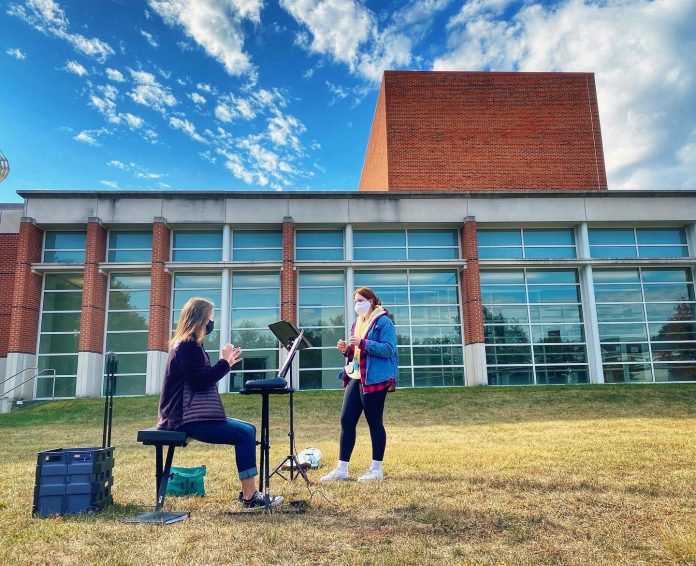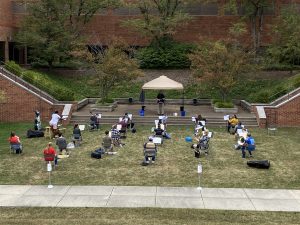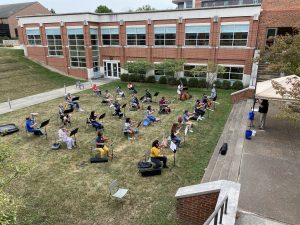
With less than half of the student body at DePauw and few formal gatherings around campus, the School of Music’s outdoor rehearsals have proved a novel sight—and sound—for much of the community.
From her sorority, Alpha Phi, junior Abbie Morris often hears the groups rehearsing in Theta Garden and South Quad.
“It’s been so quiet and there haven’t been a lot of people walking around so hearing that music adds an element that fills the emptiness on campus right now. I hope that they keep doing it, honestly,” Morris said.
As a tour guide, Morris also enjoys the ensembles’ presence on an otherwise barren campus.
“It’s nice when I’m giving tours to have them playing, families really like it,” she said.

Outdoor rehearsals are just one of the ways in which the School of Music has had to adapt to COVID-19. Since last March and through the summer, administrators and professors, such as Director of Productions, Steven Linville, have been working to figure out just how to keep creating music amidst a pandemic.
“Throughout the summer, members of the School of Music did a lot of research… We really had to rethink how we make music and work in music settings; examine what safety precautions to take; and determine how to best support students on and off campus,” Linville said.
But mitigating the risks of music-making during COVID-19 has proved no easy task. Both vocal and instrumental ensembles rely heavily on placing many musicians in close formation so that individual performers can accurately respond to each other. This poses a problem as the risk for COVID-19 transmission is incredibly high, especially when singing or playing wind instruments.
“Music is collaborative,” Linville said. That collaboration is challenging when you have to maintain distance. We have had to spread out our ensembles, rethink how they perform, and create new opportunities for remote performances.”

Different ensembles have taken different approaches to rethinking performance. Orchestra conductor, Orcenith Smith, has not only had to split his teaching between both on-campus and off-campus students, but between woodwinds and string instruments as well. Outdoor rehearsals accommodate woodwinds and brass players, who’s instruments are more susceptible to spreading the virus.
“Teaching in general takes longer during COVID without the ability to "sense" the class,” Smith said. But outdoor rehearsals have been useful “to feel in some way what an outdoor concert sonically would be like, having to follow the conductor in much less than ideal acoustic circumstances.”
For students studying remotely, like junior harpist Cahlia Plett, “maintaining the same work ethic when repertoire is not being rehearsed in person” has proved difficult.
“I think being a music student under remote conditions has really just emphasized how important music really is to me and my friends, and how in-person is clearly a better way to learn than remotely—specifically in this degree,” Plett said.
Junior flautist Ben Collins, who is currently on campus, also recognizes the difficulty of studying music while split on and off campus.
“How can you expect a group to play together when they can’t be in the same room?” Collins said.
Collins is a member of the University Band, a group of wind instruments led by Craig Pare’. For Pare’, all of his ensembles were required to meet outdoors. These rehearsals forced Pare’ to rethink his general approach towards practice.
“The first thing I thought was, ‘well, what are we out there for?’ Is it to get a concert ready? Nope. Is it to fulfill a requirement for an ensemble? Yeah. But what's more important? And I thought: making music,” Pare’ said. “When we’re in school, we’re one of a few opportunities around campus that each week, we meet personally, how can we make that positive?”
Both Smith and Pare’ have spent time redefining standards for such a strange semester, trying to figure out how to encourage student growth given the difficult circumstances.
Outside of ensemble work, individual practice has taken many forms for students both on and off campus.
“Being on vocalist on-campus this semester has given a slight sense of normalcy to this abnormal semester,” sophomore vocalist Grace Gliva said. “Despite the COVID regulations, being able to have in-person lessons has made things so much easier, and has given me the opportunity to work on my voice and to improve during this unconventional time.”
Sophomore violist, Lily Rutledge, also enjoys in-person lessons, though knows not everyone has had the same opportunity.
“I practice most at my house, rarely visiting the music building. I’m lucky enough to have in-person lessons, but I know this is not the case for everyone,” Rutledge said.
While some lessons may be in person, few classes are—a challenge especially difficult for music education majors completing their teaching field experiences. Senior Jon Tebbe has struggled to use the techniques he has learned at DePauw while student-teaching virtually.
“We have not been able to actually be in classrooms with students which is really hard for me. This also presents a challenge of not being able to apply the techniques we learn with real students in the field,” Tebbe said. While he has been able to use recordings and videos to supplement his classes, remote student-teaching remains rough.
Faculty at DePauw face similar challenges not just in leading ensembles, but teaching as well.
“After spring break last spring, many of us as faculty–and I count myself as one–were really, trying to suddenly adapt to teaching to a camera to a lens rather than students,” Pare’ said. “We've all put you first and thought, how can we make you and the atmosphere less stressful, even if we're feeling it?”
Despite the challenges of rehearsing during COVID-19, this semester has offered a valuable reflection on what it means to be a musician and performer.
“Our goals have been set very differently. And to tell you the truth, I don't mind that,” Pare’ said. Performance ensembles are for giving performances, absolutely. But I think it's nice to have taken a step back and thought what are we going to learn in this semester if it's not just getting ready for a concert, and I've really enjoyed the process.”


